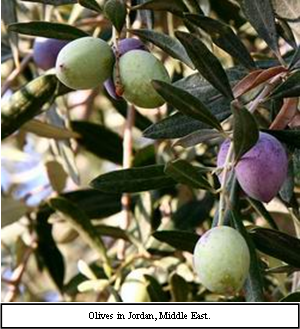The Secret Codes in Matthew: Examining Israel’s Messiah, Part 21: Matthew 26:31-27:36, by Kevin M. Williams
Oil, symbolic in the Hebraic ritual for the Holy Spirit was pressed here at Gat-Sh’manim. It was pressed still as Yeshua said to His three companions, “The spirit indeed is willing, but the flesh is weak” (Matthew 26:41). The flesh of the olive is indeed weak, and bruises easily, but it is through the pressing and ruining of that fruit’s flesh that oil is produced. Oil, which in its day provided light, restoratives, food, and the base of the holy anointing oil.
Could it be that Yeshua’s choice to bring them to the oil press—Gat-Sh’manim—was another object lesson for his disciples then as well as today?
“Arise, let us be going; behold, the one who betrays Me is at hand” (Matthew 26:46).
 Three times Yeshua had returned to find his faithful three asleep. Yes, it was probably late, and being Passover, they had just finished one of the biggest meals of the year, complete with at least four full cups of fermented wine. You and I would likely have wrestled with sleep too. But it does not seem that they even attempted to stay awake, and in his most conflicted hour, he could not count on his closest friends.
Three times Yeshua had returned to find his faithful three asleep. Yes, it was probably late, and being Passover, they had just finished one of the biggest meals of the year, complete with at least four full cups of fermented wine. You and I would likely have wrestled with sleep too. But it does not seem that they even attempted to stay awake, and in his most conflicted hour, he could not count on his closest friends.
How different from our God. In Psalms 121:4 we read, “Behold, he that keepeth Israel shall neither slumber nor sleep.”
“Betrays” here is paradidomi in the Greek. The Hebrew parallel is ramah, and appears only once in 1 Chronicles 12:17, “If you come peacefully to me to help me, my heart shall be united with you; but if to betray me to my adversaries, since there is no wrong in my hands, may the God of our fathers look on it and decide.” The Hebrew ramah is defined a bit stronger than the Greek paradidomi, meaning that the adversary has been beguiled or deceived. Certainly, we can all agree that Judas has been deceived.
“And while He was still speaking, behold, Judas, one of the twelve, came up, accompanied by a great multitude with swords and clubs, from the chief priests and elders of the people” (Matthew 26:47).
Here they stood, on Gat-Sh’manim, and when the great multitude came. “Multitude” can also be translated as “press.” But Yeshua had already been through the presses. This new “press” would test the disciples—Judas included—and the prophecy of Zechariah.
This was no small contingent of rock throwing vigilantes. These were temple guards, and there were a lot of them.
Judas, in the Greek, but Judah in his native Hebrew means, “he shall be praised.” This betrayal seems the antithesis of his namesake, as well as the Messiah, but it was sealed with a kiss (Matthew 26:48). Yet through this act, Yeshua was lifted up as prophesied, and his name came to be praised.
A kiss of greeting in those days was not at all unusual and was culturally quite acceptable, as it remains in much of the mid-east today. So it would not have struck anyone as unusual when Judas, “immediately he went to Jesus and said, ‘Hail, Rabbi!’ and kissed Him” (Matthew 26:49). It had likely occurred countless times before, but never before with this significance.
Yeshua’s response remains high and without guile, “Friend, do what you have come for” (Matthew 26:50). He calls his betrayer, “friend.” It is human nature to read sarcasm there, but neither the text—nor the character of the Messiah—give us cause to assume cynicism here. Rather, it would seem that he still holds out redemption as a choice Judas could make. As said by David, “If you come peacefully to me to help me, my heart shall be united with you; but if to betray me to my adversaries … may the God of our fathers look on it and decide.”
“Then they came and laid hands on Jesus and seized Him” (Matthew 26:50b).
The hands that had been laid on others to heal, to comfort, and to raise the dead now had unholy hands laid upon him.
Category: Biblical Studies, Pneuma Review, Summer 2006


